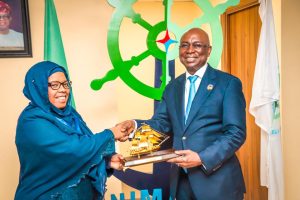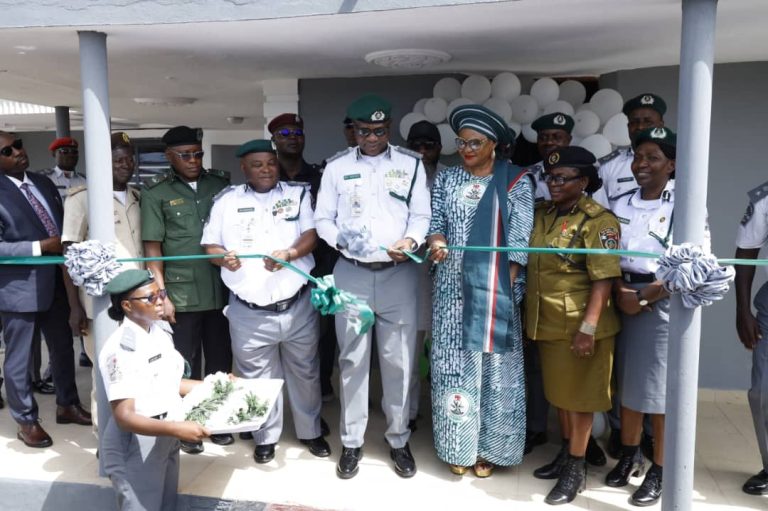…UK accuses EU of Brexit bias as it refuses to endorse aid spending***
The controversy over the Malabu Oil Block(OPL 245) won’t just go away, with President Muhammadu Buhari rejecting Attorney-General Abubakar Malami’s proposal on how to resolve the impasse.
Buhari is insisting on the continuation of the criminal proceedings against some suspects implicated in the OPL 245 scandal.
The President has also directed the Minister of State for Petroleum Resources, Dr. Ibe Kachikwu, and the Department of Petroleum Resources to stay action on the development of the oil well.
The OPL245 is an offshore oil block with about nine billion barrels of crude. It was auctioned for $1.3 billion (1.1 billion euros).
Although the Federal Government received only $210 million as Signature Bonus, about $1.092 billion was traced to a London bank account.
The cash was suspected to be slush funds allegedly used to bribe some middle men and politicians.
A former President is accused of benefiting about $200 million from the deal.
But there are concerns that the controversy over Malabu oil block has been lingering since 2001 (17 years) and there is need to resolve it.
The AGF on September 17, 2018 advised the President on four issues related to the oil block.
The AGF’s advised:
discontinuation of the civil case on OPL 245 in a Milan, Italy court and payment of the counsel hired by the Federal Government for his services;
discontinuation of all criminal matters in Nigeria in connection with the oil block;
A recommendation to the President to allow the relevant agencies to sign Heads of Agreement with Eni and Shell; and
Minister of State for Petroleum Resources and the Department of Petroleum Resources(DPR) be mandated to begin the process of using the well.
There are cases on Malabu oil block against former Petroleum Resources Minister Dan Etete, former Attorney-General of the Federation Bello Adoke (SAN), former Minister of Petroleum Resources, Mrs. Diezani Alison-Madueke, some businessmen and top officials of Eni and Shell.
A source quoted the AGF as saying “there was nothing in the proof of evidence to support the charge of money laundering against suspects and it is therefore impossible for the prosecution to prove the elements, which include illicit funds, transfer for such through various channels to re-introduce same again into the regular financial system as legitimate funds in financial institutions etc.”
“He wanted the Federal Government to pursue Nigeria’s possible investment in the disputed oil blocks rather than trying to repossess it or prosecute former Nigerian government officials or Shell or Agip-Eni chiefs involved in the deal.
“He said the Public Officers Protection Act CAP P41 Laws of the Federation of Nigeria, 2004 limits liability of Public Officers to a period of three months much naturally come to mind, considering their claim that the acts which are complained of were authorised by the three presidents before this current administration.”
In an October 29, 2018 response, President Buhari, in a memo through his Chief of Staff, Abba Kyari, rejected the Attorney-General of the Federation’s proposals on the fate of OPL 245.
A highly-placed source in the Presidency said: “The position of the President is that the law must run its full course on the controversy surrounding Malabu Oil Block.
“The position of the President is that there was no way the government would discontinue all the cases in court when a Milan judge on September 20, 2018 has already sentenced two men – a Nigerian, Emeka Obi, and an Italian, Gianluca Di Nardo – to a four-year prison term. They were both negotiators during the sale of controversial OPL 245.
”They were jailed in respect of alleged international corruption case involving oil giants Eni and Shell on OPL 245. In fact, while the court asked Obi to forfeit $98.4 million, Dino lost 21 million Swiss francs ($21.8 million, 18.6 million euros) in fines.
“The decision of the President is that the anti-graft agency, especially the Economic and Financial Crimes Commission (EFCC) should sustain its investigation of the Malabu deal in the light of development from Milan Court.
“He has also insisted that all those facing criminal charges in Nigeria on OPL 245 should be allowed to clear their names once and for all. Buhari believes the probe is not targeted at any Nigerian or multi-national firm but it is better to get to the root of the deal.
“If you review the development in Milan, you will realise that there must be more to Malabu Oil Block. How can there be convictions in Italy and we have to discontinue the cases in Nigeria?
“Do not forget that the Federal Government has seized Malabu Oil Block from four oil giants pending the conclusion of investigation and trial of those implicated in the $1.09billion deal. The oil firms are Shell Nigeria Ultra Deep Limited, Shell Nigeria Exploration and Production Company Limited (SNEPCO), Nigeria Agip Exploration Limited, Malabu Oil and Gas Limited.
“Also, the President rejected advice to go ahead with Heads of Agreement with Eni and Shell and a recommendation to mandate the Minister of State for Petroleum Resources, Ibe Kachikwu and DPR to put the block into use. He said all issues must be resolved.”
The EFCC on December 20, 2016 filed nine charges bordering on alleged mismanagement of over $1b Malabu Oil cash against Etete, Adoke, a businessman, Aliyu Abubakar, Malabu Oil and Gas Limited; Rocky Top Resources Limited; Imperial Union Limited; Novel Properties and Development Company Limited, Group Construction Limited and Megatech Engineering Limited.
The nine-count charge was filed at the Federal High Court, Abuja.
In another charge, the EFCC sued Etete, Adoke, Abubakar and eight others over alleged $801million bribe in respect of the auctioning of Malabu Oil Block.
The others are: Shell Nigeria Exploration Production Company Limited; Nigeria Agip Exploration Limited; ENI SPA; Malabu Oil and Gas Limited; Ralph Wetzels(ex- Director of SNEPCO), Casula Roberto(Italian) whilst being the Director of AGIP; Pujatti Stefeno(Italian) while being the Director in AGIP; and Burafato Sebastiano(Italian).
All the suspects have denied the charges.
Malabu was issued a licence for OPL 245 on 9th April 2001 but the Federal Government subsequently revoked the licence on 2nd July 2001.
In the meantime, the British government has taken the unprecedented step of refusing to endorse billions of pounds of EU spending on aid projects, as it accused the European commission of discriminating against UK-based organisations over Brexit.
In a vote among the 28 member states on the latest allocation of the bloc’s £26.5bn development budget, the UK government declined to give its support for aid spending for the first time.
It instead issued a statement accusing the commission of failing to offer the best value for money for European taxpayers by discriminating against British-based organisations that were seeking funding.
The criticism was made in response to a commission decision to include clauses in its contracts with aid providers stating all funding will be terminated should there be a no-deal Brexit.
British NGOs have been further warned that unless they can commit to making good the loss of funding should the UK crash out of the EU, they should not compete for funds.
A UK government statement explaining its abstention on plans for the European development fund (EDF) expressed particular frustration over the failure of the commission to respond to a letter of complaint from the international development secretary, Penny Mordaunt.
The statement, obtained by the Guardian, said the UK was “still waiting for a response to the concerns raised at a political level in August, including via secretary of state for international development’s letter to the commission of 23 August 2018, on the treatment of UK entities in the tendering process of EU programmes”.
The government said in its statement circulated to the other 27 member states and senior EU officials that the issue was of “critical importance and is having unnecessary negative consequences for ongoing and planned development programming”.
It further accused the commission of putting at risk for the beneficiaries of EU development assistance “access to the best available expertise through open and fair competition, by discouraging UK organisations from bidding to implement programmes”.
The statement said: “We have an obligation to account to the UK parliament that UK overseas development assistance is spent effectively and delivers value for money, which extends to the partners delivering UK ODA”.
The UK’s aid sector is widely regarded as one of the most effective and experienced in the world, with longstanding projects in some of the most difficult places to operate.
While the funding will be passed on to the successful applicants for contracts, as the UK was the only EU member state to abstain in the vote on 31 October, the abstention was a symbolic move highlighting the anger felt in Whitehall and the British aid sector.
The UK is a major donor to the EDF, of which it will remain a contributor until 2020, and whose goal is “poverty eradication, sustainable development and the gradual integration of the Africa-Caribbean-Pacific countries into the world economy”.
Mordaunt has already committed to filling any funding gaps for British NGOs should there be a breakdown in the Brexit negotiations, but it is feared that British organisations are still being passed over for contracts, or are being put off from competing for them.
The development is likely to inject fresh tension into Brexit negotiations at a critical time.
Claire Godfrey, the head of policy and campaigns at Bond, the UK network that represents 400 international development NGOs, said the attitude of the commission was “shameful”.
“At a time when the UK and EU should be working to reach an agreement on the future of aid and development cooperation, the EU is still refusing to remove the unfair clause stating that UK NGOs, who have world-leading expertise and experience, will no longer have access to funding post Brexit in the event of a no deal – despite the UK contributing to the joint pot, and the fact that we are an OECD country and therefore eligible for funding,” she said.
“By including the clause, the EU are continuing to effectively discriminate against UK NGOs, which could undermine efforts for future UK collaboration with European partners to deliver lifesaving aid effectively and efficiently.
“It’s shameful that we are in a standoff situation when it comes to aid and development to the world’s most vulnerable people – often these people are women and children living in extreme poverty or desperately trying to survive war.”
The Nation with additional report from Guardian UK





















